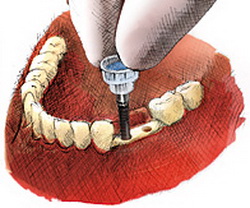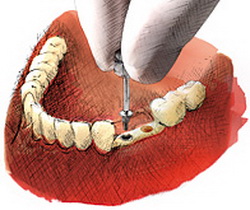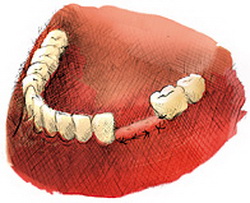Implants – course of treatment
Implant treatment – description of the procedure. Detailed information on the qualification of patients for implant treatment can be found on the page describing the general indications for implantation. Below is a description of the surgical part of implant surgery. Implant treatment can be divided into several stages:- Stage one (Fig. 1): we start with effective anesthesia guaranteeing full peace of mind of the patient, so important for optimal positioning of implants. After anesthesia, the dentist clenchs the mucous membrane at the site of the planned implantation procedure and properly prepares the field of surgery. The next step is to gently drill the bone with a drill of a very small diameter – the so-called pilot drill. After the first drilling, subsequent drilling is made with drills with an increasing diameter, until the desired size of the bore for the implant is obtained. Then the dentist proceeds to place the implant in the bone. It is important to make the drilling in accurate water cooling so as to avoid overheating the bone tissue surrounding the future implant. After the bone tissue drilling is finished, the dentist proceeds to screw the implant. Optimal selection of the diameter and length of the implant is important to achieve the best possible stabilization immediately after placing the implant in the bone. At this stage, the depth of placement of the implant is also important – it is determined individually depending on the local conditions in the patient's mouth and the type of future prosthetic reconstruction
- Stage two: (Fig. 2) After placing the implants in the bone, the so-called implant conveyor is unscrewed – that is, the part that allows the implant to be transferred to the patient's mouth and implanted in the bone without touching its titanium surface. Then the screw protects the center of the implant from the tissue sin-in-one into its interior is screwed. Sometimes patients with difficult anatomical conditions due to the small thickness or height of the bone may need to perform additional bone regeneration procedures or raise the floor of the maxillary sinus
- Stage three: (Fig. 3) The procedure ends with the insertion of stitches enabling proper healing of the wound formed after the procedure. The implant remains in the bone for a period of 2~3 months – for mandible or 5~6 months – for the jaw. During this period, depending on aesthetic indications and functional possibilities, the gap in the teeth is filled with adhesive bridges, bite rails or standard acrylic dentures with soft bedding
- What are the possibilities of dental reconstruction on implants? – General possibilities of prosthetic reconstruction are presented on the page about implants. Depending on the individual conditions in the oral cavity, prosthetic crowns, prosthetic bridges or dentures on latches can be made on implants. We invite you to an implantological consultation, during which our doctor Grzegorz Gdula will present the possibilities of implantological treatment in a given situation.
- Is it possible to function normally after the procedure? – the implantation procedure is carried out under local anesthesia, thanks to which it is completely painless, and the patient is able to return home by car immediately after the procedure. During the period 1-2 days after the procedure, depending on its extensiveness, a slight swelling may persist at the implantation site. To reduce its range and ensure proper healing of the post-treatment wound, the dentist prescribes the appropriate medications
- How many days after the procedure are the stitches removed? – stitches are designed to facilitate the healing of gum wounds and prevent the edges of the wound from parting. They are usually pulled after 8~12 days after surgery. During this period, use appropriate antibacterial rinses, which makes it much easier to heal the wound quickly

Figure. 1

Figure. 2

Figure. 3
